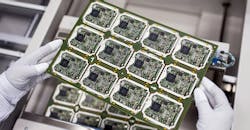Texas Instruments Snaps Out of Slowdown as Chip Demand Rebounds
Texas Instruments snapped out of a prolonged slump in its semiconductor business in the latest quarter, reporting stronger-than-forecast sales of its chips used in consumer electronics and cars. The company also gave a strong outlook for the final quarter of the year, signaling a rebound in demand even as the semiconductor industry feels the economic pressure from the coronavirus.
While it is grappling with uncertainties about the US economic recovery, TI forecast sales in the range of $3.41 billion to $3.69 billion in the fourth quarter, a huge improvement from a year ago. Profits are projected to be $1.20 to $1.40 per share as its core analog semiconductor business recovers and demand for its products used in consumer devices and cars return to levels from a year ago.
Texas Instruments has moved to maintain production at the same level as at the start of the year before the virus put large swathes of the global economy out of commission. The company said that it is selling inventory it amassed in recent months as demand for chips used in cars, smartphones and other consumer electronics starts to reboot. The company said that it plans to keep up its current pace of production to be prepared for a sudden recovery in demand for analog and other chips.
"That puts us in a position where can build inventory, so that if demand is strong, we can support it and if it's not, we can hold onto the inventory a little longer than usual," said Rafael Lizardi, chief financial officer at TI, in an analyst conference call. "At the highest level, we are very well positioned to handle whatever comes at us, whether it is in personal electronics or any other market," he said.
He said that it is taking advantage of a rebound in the automobile market after business bottomed out in the second quarter of the year as the spreading virus led to lockdowns. TI said that quarterly sales of chips used in vehicles, including microcontrollers and power management chips, restarted as the lockdowns concluded and production plants in Europe, United States, and other regions reopened.
It was also spurred by higher demand for chips used in personal computers and other consumer devices, with sales surging by 20% over the previous quarter and 15% compared to a year ago.
While demand has returned in the short term, Texas Instruments said that it remained on guard as the economic fallout resulting from the virus could continue for years to come. It has also continued to reduce its dependence on outside distributors, selling more of its products directly to customers. TI said inventory in the hands of its distributors dropped by $100 million over the last three months.
TI is the world's leading vendor of analog semiconductors, which are among the building blocks of every electronic device in the world, ranging from smartphones to automobiles to factory gear. The company sells roughly 80,000 products to more than 100,000 customers, the longest list of buyers in the global chip business. The company's quarterly results are a barometer for global sales of semiconductors and are closely observed as a bellwether for demand in the electronics market.
There is the possibility that some of its customers are building inventory to buffer against supply delays resulting from lockdowns or production problems due to the spreading virus, TI said.
"Whenever we've seen supply constraints in our industry, customers react by building up some inventory," he cautioned. "It is just our belief that it would be naïve to believe that this is the first time that wouldn't happen. So I think that those supply constraints still exist." But he added that "overall, lead times are solid and product availability is high, but that is not true for the industry."
Separately, the company said it stopped selling chips to Huawei Technologies over the last quarter to meet with new restrictions that prevent the Chinese technology giant from buying semiconductors—including parts that have been developed or manufactured with US software and tools—without a special license. Last year, the US government placed Huawei on a trade blacklist that severely limited the types of chips American firms, including Intel, Qualcomm, and TI, could supply to it.
But in May, the US government said it would further tighten restrictions on Huawei, cracking down on its access to chips and closing loopholes in the previous rules. TI said that the technology giant accounted for only 2% of its overall sales before it halted chip shipments on September 14th.The company said that it has stripped out all Huawei sales from its forecast for the fourth quarter.
TI said that sales of its core analog semiconductors jumped more than 7% to $2.8 billion. The business was buoyed by blossoming demand for signal chain and power management chips.
TI's income dropped to $1.35 billion, or $1.45 per share, from $1.43 billion, or $1.49, in the same quarter a year ago. TI said its overall sales came out to $3.82 billion, up 18% over the last quarter and 1% over the last year, outperforming the average forecast from industry analysts. Conversely, the company's profit margins slipped by roughly half a percent in the quarter to 64%.
About the Author
James Morra
Senior Editor
James Morra is the senior editor for Electronic Design, covering the semiconductor industry and new technology trends, with a focus on power electronics and power management. He also reports on the business behind electrical engineering, including the electronics supply chain. He joined Electronic Design in 2015 and is based in Chicago, Illinois.

